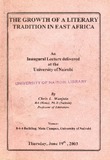| dc.description.abstract | The concern for a literary tradition in East Africa is an old one. It is tied
to the attempts by East African Men of Letters to liberate the African
aesthetic. For a long time what held sway here was the Great Tradition.
The literary culture evolved based on English letters. The English language
was picked by the African child when he made the first journey to school.
At school he or she was introduced to a culture of literacy. He or she was
formally introduced to setbooks. He or she studied books to help acquire
a certain level of literacy. The pupil formulated sentences in English,
described his first journey to school. But when he came back home he
was open to the world of his village, with all the narratives, the songs, the
riddles and the proverbs. This was especially true of children in the colonial
era who were told that the English language was the basis of their social
mobility.
The literary education of the African child was more imitative than
creative. The African school was based on the English School, with a
Debating Society, a Sunday School, The School Magazine, and the Open
School Speech Day. These institutions formed the first base available to
the African child in entering the world of public debate. The school debate
conducted its affairs in the English language. The school magazine accepted
to publish short stories and poems in the English language. The subjects
debated and written about revolved around career roles and the
adjustment of the African child to the Western world. The English literary
culture instilled into the African child was reinforced when he or she joined
the University College. The literary education acquired manifested itself
in the English Department Magazine, which changed its name to Penpoint
and Dhana, Nexus which became-Busara and Darlite which became
Umma. There were other magazines available to the student, coming
from Kampala, the cities of Nairobi and Dar es Salaam. They included
Transition, East Africa Journal and its literary supplement, Ghala and
Zuka.
Makerere University, more than any other institution of higher learning,
did a lot to shape East Africa's literary culture. The writer at that campus
fashioned his writings to the English literary tradition in themes and style.
The definition of the writer and literature that came from Makerere reflected
the view of literature by the New Criticism in England articulated by:
Mathew Arnold, T.S. Eliot, and later, F.R. Leavis. Makerereargued that
a writer drew from the tradition which had been developed by writers
who had gone before him or before her. This tradition suited critics of
East African literature who focused on realism. But it did not fit into
theoretical framework of the scholars who wanted to study literature in
indigenous languages.
New schools of literature emerged at the University of Nairobi and at the
University of Dar es Salaam. Others, like the song school was forged by
writers who grew outside the University "Eng. Lit", literary culture. These
included Okot p'Bitek, Okello Oculi, Taban Lo Liyong, and Ali A. Mazrui.
These writers worked with Pio Zirimu, Peter Nazareth, Grant Kamenju,
Ngugi wa Thiong'o, Micere Githae Mugo and Chris L. Wanjala to sever
the links of East African literary culture from The Great Tradition. East
African men of culture redefined their literature. They consciously based
their writings on the oral tradition, whilst keeping their literary practice
within the whirlwind of the world debate. The rumbles in the United States
of America and the United Kingdom over canon revision affects us here
in East Africa in a very direct way. The Departments of Literature and
English in those countries robbed our idea of literature and its relevance
to history and society, and resold it to the whole world. But East African
writers have built on the oral traditions which have become the bases for
their creativity and literary criticism. This foundation is becoming stronger
and stronger every day- | en_US |

